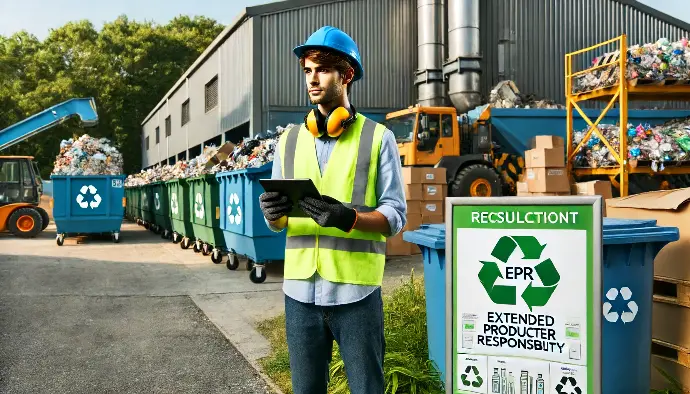Overview
Extended Producer Responsibility (EPR) is a crucial environmental policy that mandates producers to manage the disposal of products once they reach the end of their lifecycle. In India, this responsibility is encapsulated through EPR credits, which provide a market-based mechanism to facilitate compliance with waste management regulations. The EPR framework encompasses various types of waste, including plastic, electronic waste (e-waste), batteries, and more, aiming to promote sustainability and reduce the environmental burden of waste.
EPR credits serve as tradable instruments that represent a certain amount of waste that has been collected, recycled, or disposed of in an environmentally friendly manner. Producers who exceed their mandated waste management targets can sell their excess credits to other producers who are unable to meet their targets. This trading system incentivizes producers to enhance their waste management practices and fosters a circular economy by ensuring that products are reused and recycled effectively.
How it Work
The Extended Producer Responsibility (EPR) credit system is designed to ensure that producers take responsibility for the entire lifecycle of their products, including the end-of-life stage. Here is a step-by-step breakdown of how EPR credits work in India:
1. Target Setting:
- Government Mandates: The government sets specific waste management targets for producers. These targets are typically based on the producer's market share and the volume of products they introduce into the market. The targets outline the amount of waste each producer must collect, recycle, or dispose of within a specified period.
- Product Categories: Targets are tailored to different product categories, such as plastic packaging, electronic waste (e-waste), batteries, and other hazardous waste.
2. Collection and Recycling:
- Direct Management: Producers can meet their targets by directly organizing the collection and recycling of their products. This involves setting up collection points, partnering with waste management companies, and ensuring proper recycling processes.
- Working with PROs: Many producers collaborate with Producer Responsibility Organizations (PROs). PROs are specialized agencies that manage waste on behalf of producers, coordinating collection, transportation, and recycling activities.
- Authorized Agencies: Producers may also work with authorized waste collection and recycling agencies that are approved by regulatory authorities.
3. EPR Credit Generation:
- Certification: For every unit of waste collected and recycled or disposed of above their assigned target, producers generate EPR credits. These credits are certified by the regulatory authorities, ensuring that the waste has been managed in an environmentally sound manner.
- Documentation: Producers must maintain detailed records of the amount of waste collected, the recycling processes used, and the resulting EPR credits. This documentation is crucial for regulatory compliance and for future audits.
4. EPR Credit Trading:
- Market-Based Mechanism: EPR credits are tradable. Producers who generate more credits than required can sell their excess credits to other producers who are unable to meet their targets. This creates a market-based mechanism that encourages efficient waste management practices.
- Trading Platforms: EPR credits can be traded on designated platforms or through direct agreements between producers. These platforms ensure transparency and facilitate the trading process.
5. Compliance Reporting:
- Regular Reporting: Producers are required to submit regular reports to regulatory bodies detailing their waste management activities. These reports include information on the amount of waste collected, recycled, disposed of, and the EPR credits generated and traded.
- Audits and Inspections: Regulatory authorities may conduct audits and inspections to verify the accuracy of the reports and the compliance of the producers with EPR regulations. Non-compliance can result in penalties and legal actions.
Benefits
EPR credits offer several significant benefits, both environmental and economic:
1. Encourages Recycling:
- The EPR credit system incentivizes producers to invest in waste collection and recycling infrastructure. This leads to higher recycling rates and a reduction in the volume of waste sent to landfills.
2. Reduces Environmental Burden:
- By promoting proper waste management, EPR credits help mitigate the adverse environmental impacts of waste, such as pollution and resource depletion. Proper disposal and recycling prevent harmful substances from entering ecosystems.
3. Promotes Innovation:
- The need to meet EPR targets encourages producers to design products that are easier to recycle and have longer lifespans. This drive towards sustainable product design helps reduce waste generation and supports the principles of a circular economy.
4. Creates Economic Opportunities:
- The EPR credit trading system creates a dynamic market for waste and recycling services. This not only generates economic opportunities for waste management companies and recyclers but also supports job creation in the environmental sector.
5. Enhances Corporate Responsibility:
- EPR credits encourage companies to take greater responsibility for the environmental impacts of their products. This leads to improved corporate image and brand loyalty, as consumers increasingly prefer companies that demonstrate commitment to sustainability.
Challenges
Despite the benefits, the EPR credit system also faces challenges:
1. Implementation:
- Effective implementation requires robust monitoring and enforcement mechanisms to ensure that all producers meet their obligations. This includes accurate tracking of waste collection, recycling activities, and credit trading.
2. Data Accuracy:
- The success of the EPR system hinges on accurate data regarding waste generation and recycling rates. Inaccurate or incomplete data can undermine the credibility and effectiveness of the EPR credit system.
3. Integration of the Informal Sector:
- In many developing countries, including India, the informal sector plays a significant role in waste collection and recycling. Integrating these informal workers into the formal EPR system is a challenge but is crucial for achieving comprehensive waste management.
In conclusion, EPR credits are an innovative approach to managing post-consumer waste and promoting sustainability in India. By incentivizing producers to improve their waste management practices, EPR credits help reduce environmental impact, encourage product innovation, and create economic opportunities in the waste management sector.
FAQs
EPR is a policy approach that holds producers accountable for the
disposal and recycling of their products at the end of their lifecycle.
In India, this includes managing waste such as plastic, e-waste, and
batteries, to promote sustainable waste management and reduce
environmental impact.
EPR credits are tradable instruments that represent the
collection, recycling, or disposal of waste in an environmentally
friendly manner. Producers earn these credits by exceeding their waste
management targets, which they can then sell to other producers who need
to meet their obligations.
EPR credits encourage recycling, reduce environmental burden,
promote product innovation, create economic opportunities, and enhance
corporate responsibility. These benefits help businesses comply with
regulations, improve their sustainability practices, and boost their
brand image.
Producers, importers, and brand owners (PIBOs) in India must
comply with EPR regulations. This includes entities involved in
producing, importing, or selling products that generate waste, such as
electronics, plastics, and batteries.
Producers can meet their EPR targets by directly organizing the
collection and recycling of their products, partnering with Producer
Responsibility Organizations (PROs), or working with authorized waste
collection and recycling agencies.
PROs are specialized agencies that manage waste on behalf of
producers. They coordinate the collection, transportation, and recycling
of waste, helping producers meet their EPR targets efficiently.
EPR credits can be traded on designated platforms or through
direct agreements between producers. This market-based mechanism allows
producers who exceed their targets to sell their excess credits to those
who need to meet their compliance obligations.
Challenges include effective implementation, accurate data
tracking, integrating the informal sector, and ensuring robust monitoring
and enforcement mechanisms. Addressing these challenges is crucial for
the success of the EPR system.
EPR promotes a circular economy by incentivizing producers to
design products that are easier to recycle and have longer lifespans.
This reduces waste generation and encourages the reuse and recycling of
materials, contributing to a sustainable economic model.
Technologies such as waste management software and IoT-enabled
smart bins are used to optimize waste collection, track recycling
activities, and ensure accurate reporting. These technologies enhance the
efficiency and effectiveness of EPR compliance.

